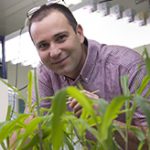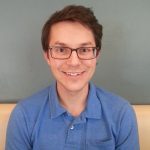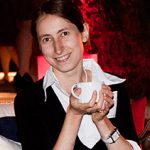The School of Biological Sciences is excited to welcome four new assistant professors and one lecturer with potential security of employment to our Fall 2013 faculty roster. With research interests ranging from ecology of plant traits and evolution of genomes to tumor and melanoma metastatic progression, our new faculty’s scholarly contributions will further expand the wide range of research areas offered.
Sergio Rasmann, Ecology and Evolutionary Biology, Assistant Professor
 Dr. Sergio Rasmann is a broadly trained biologist who is interested in the ecology and evolution of plant traits that confer resistance against insect herbivore or pathogen attack. Sergio Rasmann has worked in many different habitats including cornfields of Hungary, deciduous forests of Easter North America, the Mediterranean coast of Chile and the Swiss Alps, studying the mechanistic underpinning of plant defensive strategies for better crop protection, and how plant and animal communities are evolving during current climate change.
Dr. Sergio Rasmann is a broadly trained biologist who is interested in the ecology and evolution of plant traits that confer resistance against insect herbivore or pathogen attack. Sergio Rasmann has worked in many different habitats including cornfields of Hungary, deciduous forests of Easter North America, the Mediterranean coast of Chile and the Swiss Alps, studying the mechanistic underpinning of plant defensive strategies for better crop protection, and how plant and animal communities are evolving during current climate change.
He received a B.S. (2001), and a M.S. (2002) in Biology at the University of Neuchâtel in Switzerland. At the same University, he earned his Ph.D. in 2006 working on below ground plant-herbivore-predator interaction. After the Ph.D., he spent one year doing developmental aid in Bolivia, and in the meanwhile obtaining a post-doctoral fellowship to deepen his interests in the evolutionary mechanisms of plant herbivore interaction at Cornell University in upstate NY. In 2011, he became research associate at the University of Lausanne in Switzerland. He has served as primary advisor for six master-students, two post-doctoral students, several undergraduate students, and has served as external supervisor of four Ph.D. students. The Swiss Science Foundation has mainly supported his research. He is excited to join the faculty of Ecology and Evolutionary Biology and help the department’s research, teaching and engagement missions.
J.J. Emerson, Ecology and Evolutionary Biology, Assistant Professor
Dr. J.J. Emerson is broadly trained in topics including ecology and evolutionary biology, genomics, and biochemistry. Dr. Emerson is interested in the evolution of genomes and uses statistical and computational approaches in studying large datasets to address topics in molecular evolution and population genetics. He has studied the origin of new genes, acquisition of new genetic elements, evolution of new expression patterns, and sex chromosome evolution. While Dr. Emerson focuses on model systems like the fruit fly Drosophila and the yeast Saccharomyces, he has also worked on human, mouse, chicken, ciliates, fish, and snakes. He received two BA’s (2000) in Ecology & Evolutionary Biology and Biochemistry at Rice University, graduating magna cum laude. He did his doctoral work at the University of Chicago in the Department of Ecology & Evolution, earning his PhD in 2006. His thesis work focused on 1) learning how movement patterns of new gene copies are related to sex chromosome evolution in human, mouse, and chicken; and 2) developing methods to study the evolutionary dynamics of copied and deleted segments in the Drosophila genome. He was the recipient of the Distinguished Postdoctoral Research Fellowship in the Genome Research Center at Academia Sinica, in Taipei, Taiwan, where he worked from 2006-2010. While at Academia Sinica, Dr. Emerson developed statistical methodology to use newly developed sequencing technology to investigate the evolution of gene expression patterns in yeast. In 2010, Dr. Emerson accepted a second postdoctoral position at UC Berkeley’s Department of Integrative Biology to work on the evolution of sex chromosomes, where he has investigated how sex chromosomes differentiate and has developed statistical models for finding sex chromosomes using high throughput sequencing technology. In 2013, Dr. Emerson started as an Assistant Professor in the Department of Ecology & Evolutionary Biology at UC Irvine.
Justin Shaffer, Developmental and Cell Biology, Lecturer PSOE
 Dr. Justin Shaffer is joining us at UC Irvine with the goals of studying and maximizing student learning in biological sciences courses. He recently completed a research and teaching postdoctoral fellowship at the University of North Carolina in Chapel Hill where he not only performed research studying the molecular mechanisms of muscle contraction in marine cephalopods, but he also was trained in modern pedagogical techniques and student-centered learning. Justin put this training to use by developing and teaching courses at North Carolina A&T State University and at UNC Chapel Hill. Prior to his postdoc, Justin received his PhD in Bioengineering from the University of Washington in Seattle where he studied the molecular, biochemical, and biophysical interactions of cardiac contractile proteins in models of heart disease. Now as a Lecturer PSOE at UC Irvine, Justin will focus on developing and teaching student-centered non-majors and majors biological sciences courses, studying the development and retention of scientific literacy skills in students, and training graduate students and postdocs to be excellent teachers and mentors.
Dr. Justin Shaffer is joining us at UC Irvine with the goals of studying and maximizing student learning in biological sciences courses. He recently completed a research and teaching postdoctoral fellowship at the University of North Carolina in Chapel Hill where he not only performed research studying the molecular mechanisms of muscle contraction in marine cephalopods, but he also was trained in modern pedagogical techniques and student-centered learning. Justin put this training to use by developing and teaching courses at North Carolina A&T State University and at UNC Chapel Hill. Prior to his postdoc, Justin received his PhD in Bioengineering from the University of Washington in Seattle where he studied the molecular, biochemical, and biophysical interactions of cardiac contractile proteins in models of heart disease. Now as a Lecturer PSOE at UC Irvine, Justin will focus on developing and teaching student-centered non-majors and majors biological sciences courses, studying the development and retention of scientific literacy skills in students, and training graduate students and postdocs to be excellent teachers and mentors.
Alexander Boiko, Molecular Biology and Biochemistry, Assistant Professor
Dr. Boiko received his Ph.D. degree in the area of molecular biology and cancer genetics from the University of Illinois at Chicago, where he worked in the laboratory of Dr. Andrei Gudkov on the molecular mechanisms of p53 mediated tumor suppression. As an undergraduate student in the laboratory of Igor Roninson and later as a pre-doctoral student in the laboratory of Andrei Gudkov at the Department of Genetics, University of Illinois at Chicago, Alexander was involved in the application of genetic suppressor element (GSE) methodology to discover new anticancer drug target genes. This strategy was used to isolate potent inhibitors of Topoisomerase II and Kinesin that conferred resistance of tumor cells to chemotoxic agents. While being a doctoral student in the same lab Alexander applied GSE technology to develop bi-cistronic retro- and lentiviral vector-based expression systems for studying molecular mechanisms of transformation mediated by most commonly mutated tumor suppressor gene, p53. In collaboration with Dr. Kiyokawa in 2002 this system was successfully used to reveal the essential role of CDK4 in tumorigenic conversion of primary cells mediated by suppression of p53 and activation of oncogenic Ras. To gain further insights into the mechanism of p53 mediated tumor suppression function Alexander combined microarray profiling with functional genetic screen to isolate genes whose repression would cooperate with oncogenic Ras in transformation of p53 wild type cells. As a result, in 2006 Alexander described a systematic approach to identify downstream mediators of tumor suppressor function of p53, consisting of global gene expression profiling, focused short hairpin RNA (shRNA) library creation, and functional selection of genetic elements cooperating with oncogenic Ras in cell transformation. In 2006 Dr. Boiko moved to Stanford University and joined the laboratory of Dr. Irving Weissman as a postdoctoral researcher. There he used human surgical melanoma samples along with advanced methods of cell isolation and transplantation to identify human melanoma tumor initiating cells based on the expression of neural crest stem cell marker CD271/NGFR. Currently, Dr. Boiko continues to study cellular/molecular origins of melanoma initiation and clonal progression, as well as, trying to determine factors underlying aggressive metastatic properties of this disease in his own laboratory at the University of California-Irvine. Alexander is avid tennis and chess player; his other personal interests include astronomy, arts, traveling and hiking.
Olga Razorenova, Assistant Professor, Molecular Biology and Biochemistry
 Dr. Razorenova received her Master’s in Molecular Genetics from Lomonosov Moscow State University
Dr. Razorenova received her Master’s in Molecular Genetics from Lomonosov Moscow State University
(Russia) in 2000. She started her PhD program in the area of Molecular Biology at the Engelhardt Institute of Molecular Biology in Moscow the same year. Olga was fortunate to work both in Russia and in USA, at the Department of Molecular Genetics at the Cleveland Clinic, during her Graduate years under Dr. Chumakov’s supervision. Olga’s thesis was on dissecting p53-dependent transcription of target genes, and its downstream signaling pathways in melanoma. To broaden her research experience, she started working in the field of angiogenesis, with specific emphasis on tumor angiogenesis. The main focus of her studies was integrin-mediated signaling, which she conducted in Dr. Byzova’s laboratory in the Department of Molecular Cardiology, Cleveland Clinic. Olga got her PhD in 2006 and started her postdoctoral training in Dr. Giaccia’s laboratory in the Department of Radiation Oncology at Stanford University. She has been leading the projects concerning the impact of hypoxic tumor microenvironment and hypoxia inducible factor (HIF) on the regulation of transcription of genes contributing to tumor metastasis. Olga has taught several biology classes for Stanford’s educational program (SPLASH) and has mentored multiple students throughout her research career in the lab. Her personal interests include jewelry making, dancing, reading, attending concerts and art exhibitions, traveling.
